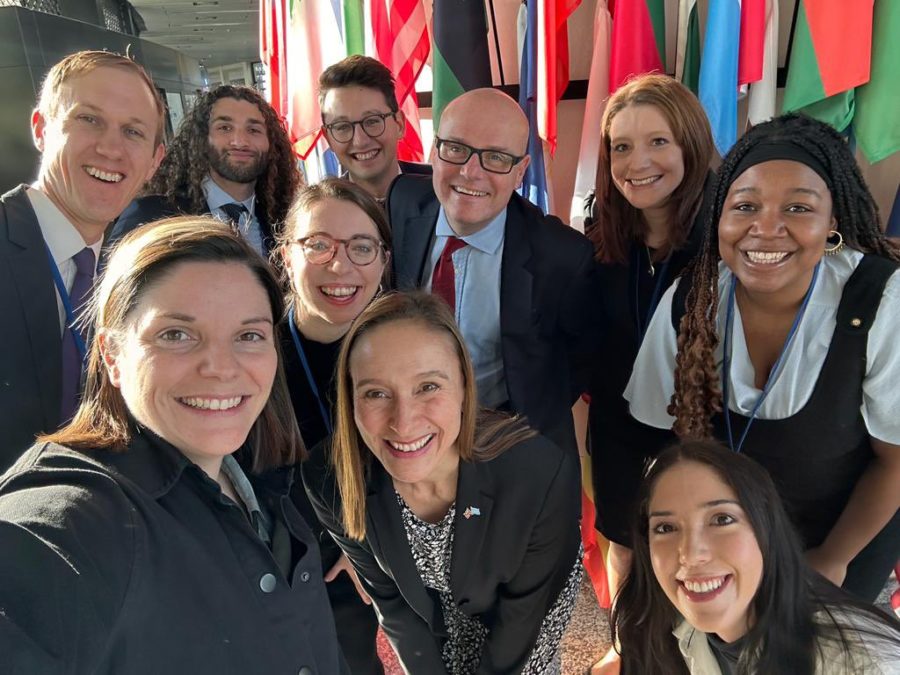12th May 2023 Vienna
Tackling global cybercrime in Vienna

You might hear about ‘cybercrime’ in the news; but what does it mean, how does it affect us and how are we tackling it in Vienna?
Cybercrime is a global threat. It affects each of us more than we might realise, from Ransomware attacks that threaten NHS services to online scams and other types of fraud, including hacking of social media and email. With technology changing at lightning speed, crime is increasing exponentially. We need to keep up to make sure that citizens in the UK, and globally, are kept safe.
This is where the UN comes in.
Governments are working to create a brand new legally-binding treaty on cybercrime. In classic UN style, the treaty has an unwieldy and long title! The ‘Comprehensive International Convention on Countering the Use of Information and Communications Technologies for Criminal Purposes’ and negotiations are starting from a low base – countries first need to agree a definition of cybercrime!
So far this year, the UK Mission Vienna team has spent 4 weeks negotiating alongside colleagues from FCDO, Home Office and the UK Mission in New York. We are 1 of more than 150 countries trying to influence the first draft of the treaty that the Chair will produce. Key debates are around the crimes to be included – How should this treaty respond to the online exploitation of children? How do we ensure that any intrusive state powers are properly balanced with appropriate human rights safeguards? And what assistance will member states need to implement the treaty after we’ve agreed it?
Getting a UN treaty off the ground is no mean feat. One of the big challenges is that cybercrime is so broad and wide-ranging – it needs cooperation between government, non-governmental organisations as well as the private sector – all of whom have different understandings of what cybercrime actually is. The UK has been particularly active in supporting other parts of society to have a voice in UN negotiations; having input from a broad range of stakeholders should help to make the treaty as inclusive as possible. And I’m particularly proud that the UK has been leading the charge on getting more women working in this space and we have supported many female cyber experts from across Africa to attend as part of our work with the Women in Cyber initiative.
We are now preparing for the sixth and final full negotiating session in August in New York. Agreeing a convention in the time left will be no mean feat; states will only have had sight of the draft treaty for a few months so will need to be well-coordinated to make the most of the fortnight of negotiations in New York at the end of the summer.
Extensions to the deadline seem likely and the UK will be well prepared to keep going to try to secure a treaty that works and delivers real impact – after all, cybercrimes and the harms caused by them to the UK public and people across the world are not going away any time soon.
Cybercrime #ViennaOpportunities
Tackling crime across borders is an exciting and rewarding area to work in and there are lots of opportunities in this area of work. British national, Martha, lives in Vienna and works as Deputy Head of Strategic Police Matters, including cybercrime, at the OSCE (Organisation for Security and Cooperation in Europe).
Watch her video to hear more about her work:
The UK Mission and British Embassy in Vienna are showcasing stories of Brits working in the international system in Vienna. Follow the conversation on our UK Mission Vienna Twitter and the hashtag #ViennaOpportunities.
If you’re interested in working for an international organisation, you can receive job alerts from impactpool.org.
The extent of cybercrime’s impact, from ransomware to online scams, is quite concerning. The challenge of defining cybercrime and aligning various stakeholders underscores the intricacies involved. The UK’s commitment to inclusivity and promoting women in the field is commendable. Martha’s story highlights the real-world impact of these efforts. As negotiations near a critical phase, I’m left curious about the potential outcomes and the treaty’s effectiveness in curbing cybercrime.